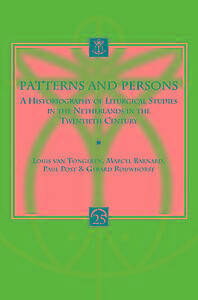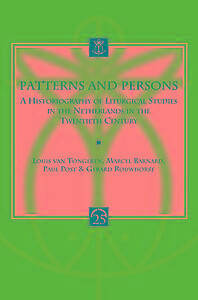
Je cadeautjes zeker op tijd in huis hebben voor de feestdagen? Kom langs in onze winkels en vind het perfecte geschenk!
- Afhalen na 1 uur in een winkel met voorraad
- Gratis thuislevering in België vanaf € 30
- Ruim aanbod met 7 miljoen producten
Je cadeautjes zeker op tijd in huis hebben voor de feestdagen? Kom langs in onze winkels en vind het perfecte geschenk!
- Afhalen na 1 uur in een winkel met voorraad
- Gratis thuislevering in België vanaf € 30
- Ruim aanbod met 7 miljoen producten
Zoeken
Patterns and Persons
A Historiography of Liturgical Studies in the Netherlands in the Twentieth Century
Tongeren L. van, Post P. Barnard M.
€ 120,95
+ 241 punten
Omschrijving
Scholarly research does not develop in an historical vacuum. The questions addressed and the vantage points from where they are studied, are closely related to the social and cultural contexts in which the researchers are working and living. This holds in a particular way true for liturgical research done in the twentieth century. The research carried out in this period was clearly influenced by the changes that various forms of Christianity, and more in general religion as such, went through during this century. The clearest evidence of the strong impact these changes had on liturgical practice is provided by a series of sweeping liturgical reforms taking place in the second half of the century. The research of liturgical scholars was indirectly or directly influenced by the social and cultural processes that were taking place. These processes unavoidably had their effect on the questions that were raised and on the foci that were chosen and it also coloured, at least to some extent, the interpretations given to the data studied. During the last few decades, these issues have frequently and thoroughly been discussed by the Dutch liturgical scholars who are cooperating within the open, inter-confessional and interdisciplinary setting of the Institute for Liturgical and Ritual Studies located at the Tilburg University. Apart from furthering reflection about the various scholarly paradigms that were followed among these scholars, these discussions and conversations also aroused a historiographic curiosity, especially with regard to the development of liturgical scholarship in the Netherlands. How did liturgical studies develop in the course of this century in the Netherlands? What scholarly approaches were predominant? What paradigms and shifts of paradigm can one discern? And how did these relate to the development of liturgical practice and the underlying religious, cultural and historical processes? In several respects the Dutch case was unique, due to specific historical circumstances. These considerations led to the decision to devote a common research project to the history of liturgical studies in the Netherlands and this volume is the final outcome of this project.
Specificaties
Betrokkenen
- Auteur(s):
- Uitgeverij:
Inhoud
- Aantal bladzijden:
- 500
- Taal:
- Engels
- Reeks:
- Reeksnummer:
- nr. 25
Eigenschappen
- Productcode (EAN):
- 9789042923010
- Verschijningsdatum:
- 29/10/2010
- Uitvoering:
- Paperback
- Formaat:
- Trade paperback (VS)
- Afmetingen:
- 150 mm x 229 mm
- Gewicht:
- 748 g

Alleen bij Standaard Boekhandel
+ 241 punten op je klantenkaart van Standaard Boekhandel
Beoordelingen
We publiceren alleen reviews die voldoen aan de voorwaarden voor reviews. Bekijk onze voorwaarden voor reviews.









